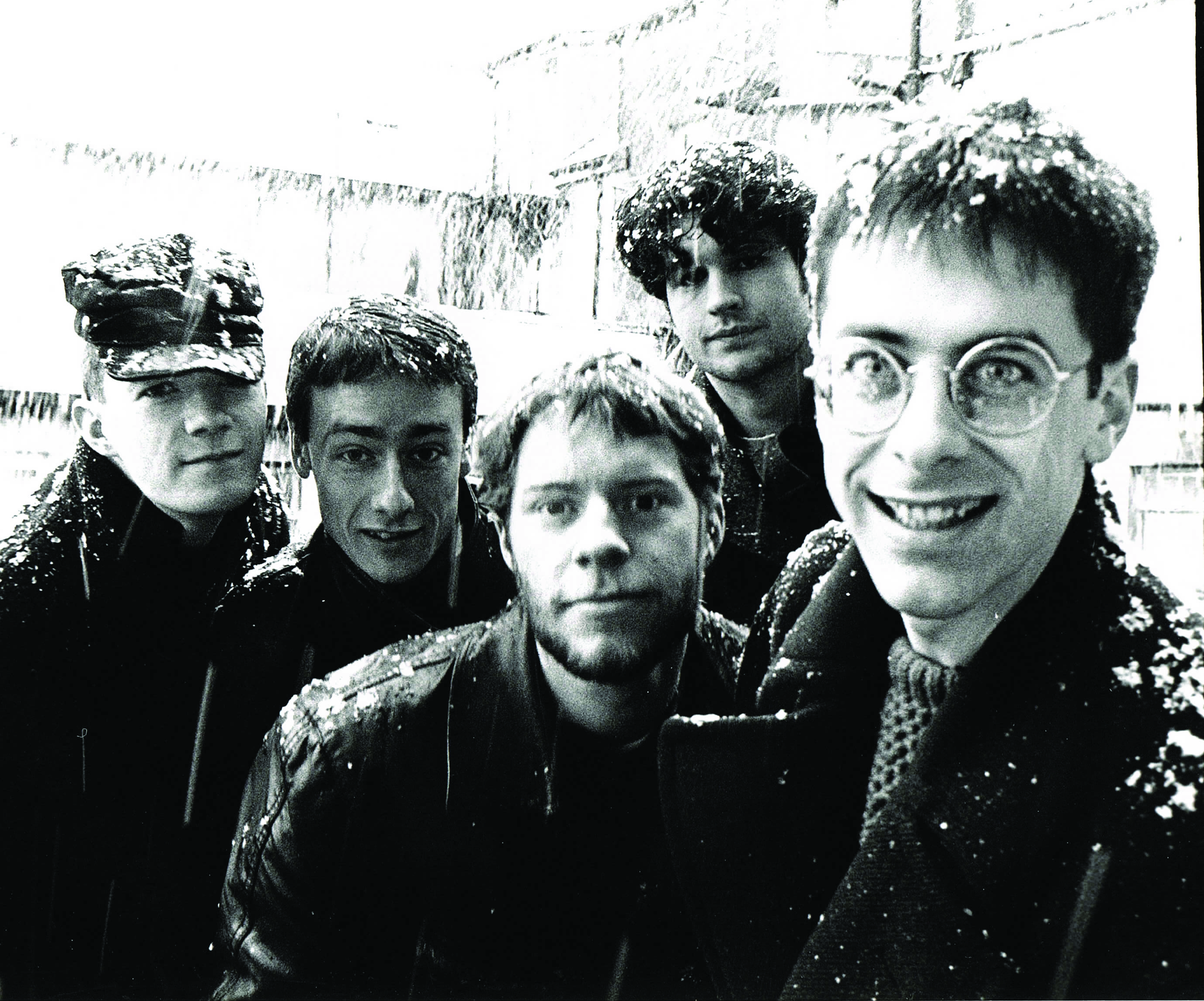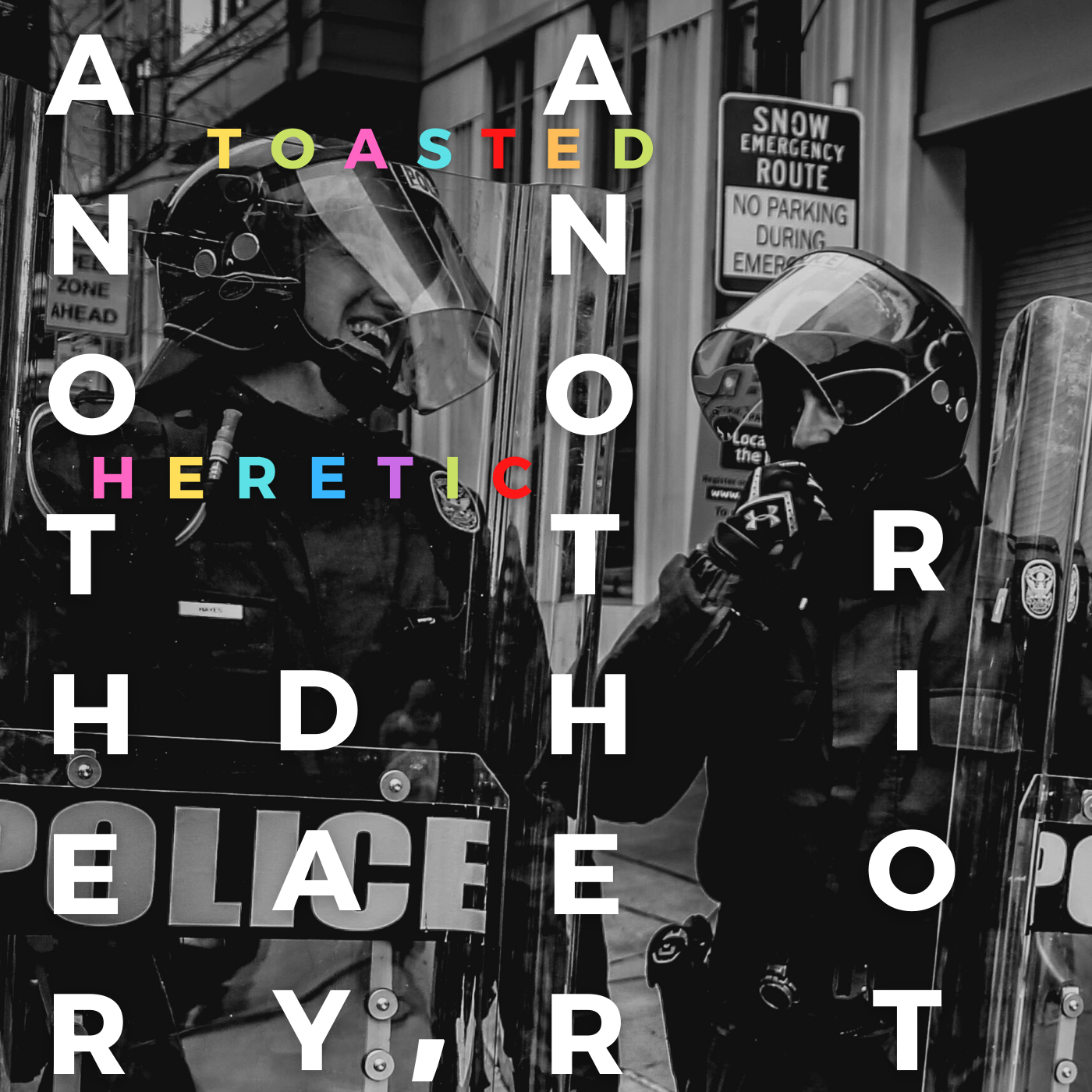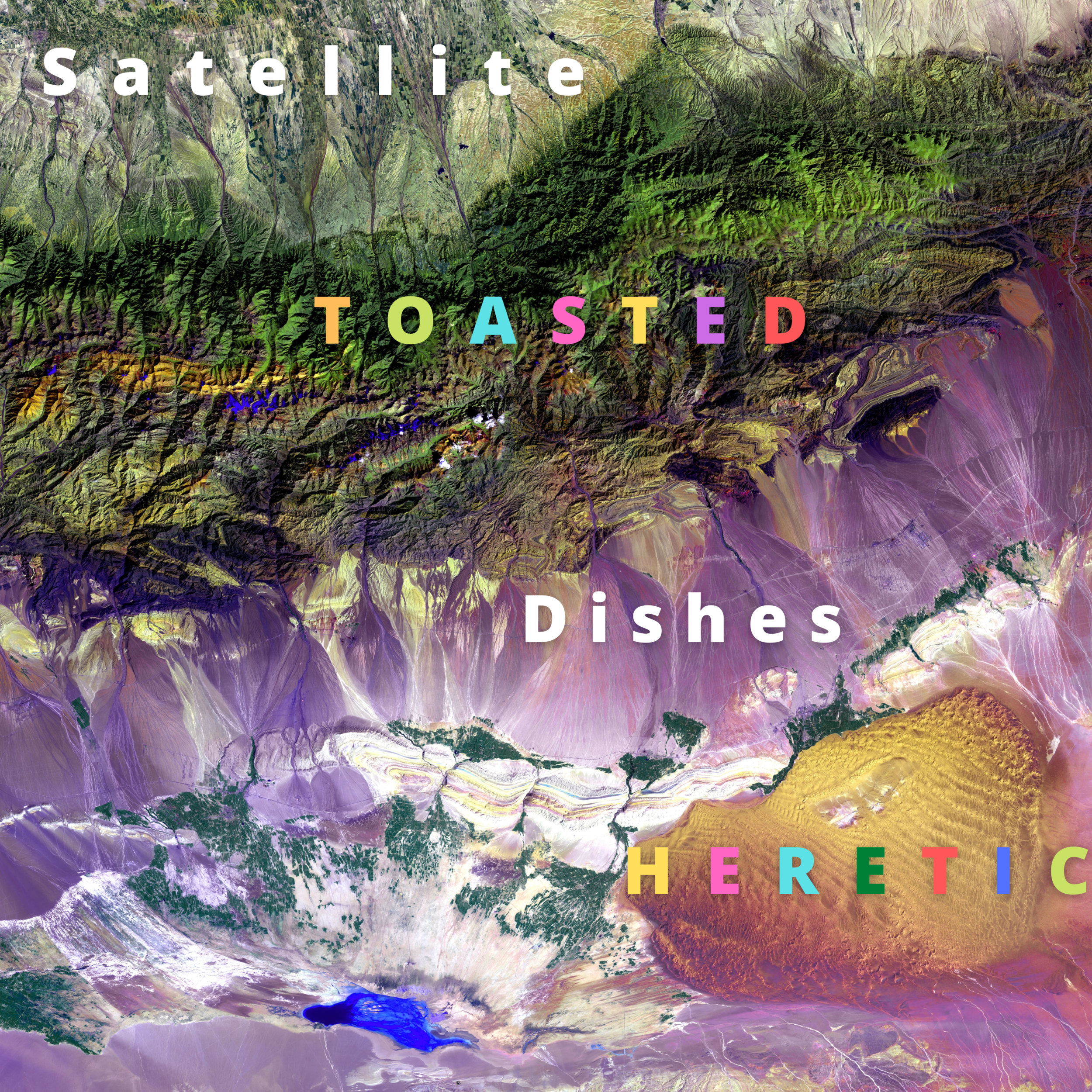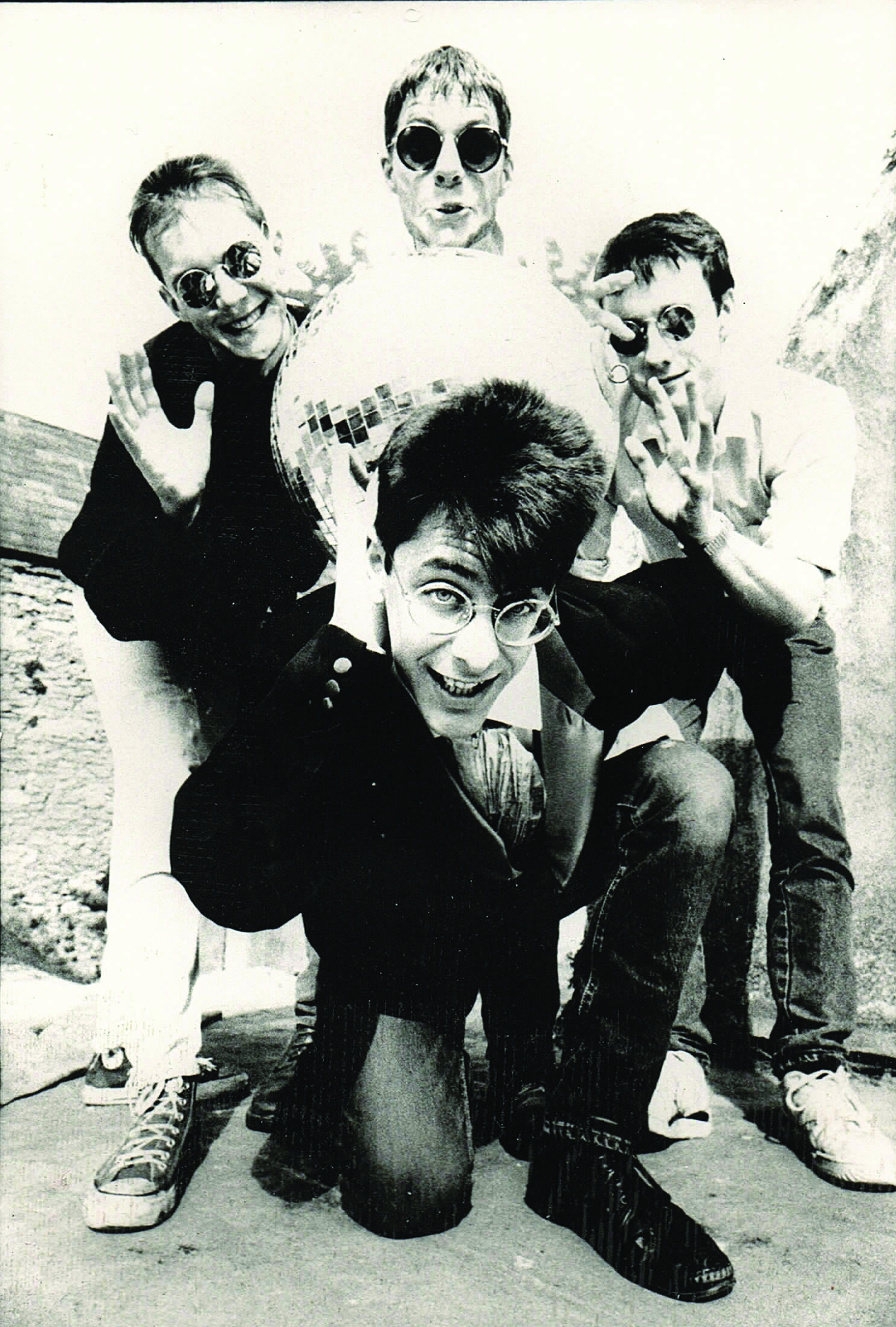Another Day, Another Riot, another world: Julian Gough on Toasted Heretic 30 years on
/Toasted HEretic stand in the snow, on Aengus McMahon’s roof, some time in the early 1990s. Aengus (the beardy one) took the photo; I can’t remember if he used a timer, or a release cord. Left to right: Neil, Declan, Aengus, Barry, Julian
How Ireland has changed since we made our cult – and newly rereleased – third album
(This piece first appeared in the Irish Times, on May 20th, 2021.)
May 18th was the 300th anniversary of the burning at the stake, by the Spanish Inquisition, of the oldest heretic in Europe (Maria Barbara Carillo, age 95; burnt in Madrid).
On that date, to celebrate her memory, and the memory of old heretics everywhere, my former band, Toasted Heretic, rereleased our cult third album, Another Day, Another Riot.
To release the same album, twice, 30 years apart, is to perform a most peculiar A/B test.
What did those songs mean, pressed into the black, aromatic, hydrocarbon grooves of a vinyl LP, at the start of the 1990s?
What do they mean, wirelessly and weightlessly streamed as digital bits to my bluetooth headphones, in 2021?
Who was I then?
Who am I now?
(And who, indeed, are you?)
The results of the experiment are occasionally unsettling.
In the great Borges story, Pierre Menard, Author of the Quixote, an early 20th-century writer and polymath, Pierre Menard, writes Don Quixote again, word for word: and, though every word is the same as Cervantes’ original, it is an utterly different book. The effect those words have on the reader has been completely transformed by the passage of time between the two Quixotes. And so, now, I find myself both Cervantes and Menard, one foot either side of this 30-year-wide abyss. As Heraclitus would undoubtedly have put it, had he had the music streaming service Spotify on his iPhone; “You cannot listen to the same stream twice; for you are not the same person, and it is not the same stream.”
On the launch date, I log into the Spotify for Artists app (where musicians have private access to the streaming statistics for their works), and I can see Another Day, Another Riot begin to roll out around the world, timezone by timezone: “Released in 19 out of 178 countries…”
I check in throughout the day.
“…55 out of 178 countries…”
“…98…”
“…173…”
“Released.”
The delightful new sleeve of Toasted Heretic’s Another Day, Another Riot album features a detail from a great photo by Spenser H, on Unsplash
Then I log into Apple Music for Artists.
The songs are there, too. Released.
Amazon Music for Artists.
They are there.
To understand how that feels, you must understand that it has been impossible to buy these songs new, to hear these songs on demand (however intense your desire), for over 20 years. The last time I saw a second-hand CD of the album for sale on Amazon, it was priced at an absurd $902. By the time our drummer and producer, Neil Farrell, tracked down the original dusty reels of magnetic tape, to remaster the album for rerelease, even I no longer had a CD or vinyl copy. These complicated, multilayered sounds, into which we had all poured so much of our young selves, had come perilously close to ceasing to exist.
But now the great global corporations have silently switched my youth back on. And rushing back with the songs come memories; memories that came just as close to getting lost forever.
These days, I write novels (like Connect), and children’s books (like the Rabbit & Bear books, illustrated by Jim Field), and oddities like the End Poem (the peculiar narrative that ends the computer game Minecraft).
But I learned how to write over 30 years ago, as the singer with Toasted Heretic.
By day, I studied English literature and philosophy in UCG (since rebranded as NUI Galway). By night, I wrote lyrics saturated in that literature, and that philosophy (name-checking Isherwood, Aristotle, Nabokov, Yeats…) And also saturated in the hormones of youth. Listening back, it’s startling how obsessed with sex the songs are. With fame; with beauty; but mostly with sex. Was I really that horny? Oh wait, yes, I was. Let us go back…
Toasted Heretic started out recording cassette albums in our drummer Neil’s parents’ living room in the late 1980s, as teenagers. It was joyously DIY. We didn’t even have a bass guitar, we just tuned down a regular one till it sounded like one. Our drum machine was made by a toy company. (The snare drum sound was once described as “a shoelace furiously lashing an empty crisp packet.”) When we finished an album, we would send the Dave Fanning Show a copy of the master tape – Dave would play us that night on RTÉ Radio 2 (since rebranded as 2FM), and read out our address. Hundreds of people posted a fiver to Neil’s parents’ house, and we sent them a cassette, and a packet of Tayto Cheese & Onion crisps. Because so many of our songs name-checked writers, we started off by selling the albums through bookshops. We were almost completely disconnected from the “real” music industry. We were just making it up. It was fun.
But by the time we recorded Another Day, Another Riot, we’d sold thousands of our home-made albums, we’d played London and New York, we’d signed a record deal, we were in a real studio, and we had a top ten hit in Ireland. We were packing out lively little venues like the Baggot Inn on consecutive nights, we were Single of the Week in Melody Maker in the UK, we were getting national airplay in France…
This was what I had always wanted, and yet I found myself slowly drifting from hoping we would get famous, to worried we would get famous; worried what that might do to me, and us. I had noticed a common factor in many of the famous people I was now meeting: at the point they got famous, they stopped growing up. (A middle-aged teenager can be a tragic figure.) And I hadn’t grown up yet; but I knew that I desperately needed to. So, I didn’t feel ready for the fame I was chasing; I didn’t feel stable enough to handle it.
The songs came out of that ambiguity. Just after signing our deal, as I left RTÉ after doing an interview, I bumped into Sinéad O’Connor, coming in to do one. Newly famous, shaven headed, she had just had a number one hit around the world; she had everything I wanted; and she looked totally overwhelmed by what was happening to her. I put the moment into a song. (It became our hit, Galway and Los Angeles.)
I wrote a song, too, about Kate Bush (An Enormous Request). Back then, she had, famously, toured just once. Appalled and overwhelmed by the crude response from the young men in the audience to her very personal, delicately choreographed shows, she had retreated from the hungry, consuming gaze of the crowd, to the safety, the privacy, of studio and family.
I wrote a song about Freddie Mercury (Another Day, Another Riot); about the Sun newspaper sending a wreath to his funeral, with a microphone hidden in it, then printing the overheard grief of his friends as exclusive interviews.
Songs about all the ways sudden fame could fuck you up.
Listening to them now, though, they read rather differently. Menard’s Another Day, Another Riot is not Cervantes’ Another Day, Another Riot. That fear of becoming famous, or infamous, overnight, seemed pretty esoteric back then. An incredibly niche problem for unstable, insecure, want-to-be rock stars like me.
But the terror of overnight, destabilising fame is now everybody’s terror. All of us risk uncontrollable worldwide fame, and condemnation, every time we post anything of ourselves online. A single tweet, or a shaky snippet of video taken on a phone, taken completely out of context, can get you reviled around the world. In that sense, the album feels startlingly contemporary.
My other thoughts are more personal. I wish I could speak to the young man singing these songs. Give him advice. Because he doesn’t quite know how to live yet. He doesn’t yet know how to treat other people. He fights with men, particularly authority figures, when he doesn’t need to. He sees the surface of women very clearly, but he can’t yet see their depths. He often treats them badly, and doesn’t even notice he has done so. He is a product of his times, who has not yet got a perspective on those times, and thus himself. (He thinks he has; but he hasn’t.)
Well, at least he’s trying. There are songs (Forgotten; Going Public) where he glimpses, and even tries to explore, the character flaws which he will spend the next three decades fixing.
Toasted Heretic, early 1990s. Photo by Steven Sweet.
And, of course, to see his flaws is to see the flaws of the time, and society, that moulded him. When Toasted Heretic formed, the Catholic Church still ruled Ireland. Abortion was illegal, gay marriage was illegal, divorce was illegal. The first time I bought condoms, as a teenager in Galway, I (being unmarried) was breaking the law. I had to knock on the door of the Galway Family Planning Clinic – back then hidden away on the largely derelict Merchants Road – and be checked out first through a spy hole (in case I was a Catholic protester, or the Guards) before they would open the door.
Even a few years later, in 1992, when Another Day Another Riot was first released, homosexual acts between men were still illegal in Ireland. (Homosexual acts between women were so unthinkable, no one had even thought to pass a law against them.) In the years that followed, the battle against the Church for intellectual and physical freedom led to the legalisation of contraception, divorce, gay sex, gay marriage and abortion; but not to the post-religious Utopia many in my generation had vaguely hoped for.
The delayed arrival of easily available contraception in Ireland meant we had the 1960s in the 1980s; and so we threw off the shackles of the Catholic Church, only to immediately clamp ourselves into the fluffy Ann Summers handcuffs of a half-arsed sexual revolution whose casualties were, again, mostly women. Éamon de Valera and Padre Pio may no longer have been male role models in Ireland by the 1980s and 1990s, but their replacement by Clint Eastwood and James Bond created a whole new set of problems. (And James Bond’s replacement, more recently, by rappers, porn actors, and the terrified woman-haters of YouTube, Reddit and 4chan, hasn’t exactly moved us closer to Utopia either.)
It’s true that this new world is, in many ways, much much better than the old one. There is less overt sexism, less blatant racism, less casual homophobia, less grinding poverty. The definition of what it is to be Irish has expanded enormously; overall, we have far more individual freedom to explore a far bigger possibility space.
But in parallel with these improvements, the post-religious world – the secular, technological world – has also created new forms of heresy, as Ireland’s old, unfashionable religious taboos have been replaced by new, improved, and far more fashionable secular taboos. Taboos often quite as irrational and unscientific as the ones they’ve replaced. As an old heretic, it is reassuring to know that there is now a modest, but growing, collection of brand new things you can say – often perfectly true and unremarkable things! – that can get you excommunicated from society.
So we live, once more, in an exciting time of witch hunts and heresies. But at least it is a time of marvellous equality, where anyone, regardless of sex, age, nationality, skin colour, or sexual orientation, can be attacked from both left and right for thinking the wrong thoughts out loud.
What better time for Toasted Heretic to emerge, blinking, from their long sleep?
Final thoughts, as I listen to the album…
In the almost 30 years since that album was released, I have become a very different kind of writer, and person; less caught up in myself; less obsessed with freedom, less afraid of commitment. Less grandiose. Less brittle. I have married, twice, and – very slowly; too slowly – improved in that incredibly difficult, and rewarding, role over time. I have had children, and been, to the best of my ability, a father to them; by far the best thing I have done. The most satisfying, the most interesting. (Also the most exhausting, and occasionally the most boring – well, life is unavoidably complicated.)
I’m pleased the young man standing on the far side of the abyss, who sings these songs (and, somewhat improbably, shares my name) is slightly less of an arse now. I’m glad he avoided the catastrophe of fame. I’m happy he got a chance to grow up.
Another Day, Another Riot, by Toasted Heretic, is now available on all streaming platforms, as is their new single, Satellite Dishes




